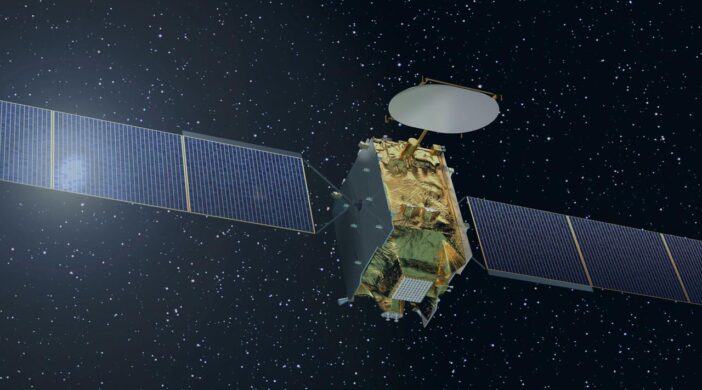WASHINGTON — Satellite companies that have spent decades operating broadcast satellites that beamed programming to millions are trying to adjust to a new environment where they have to unicast data to individuals, company executives said during a panel discussion at the Satellite 2023 Conference.
The panel included the heads of legacy satellite operators, including: Eutelsat CEO Eva Berneke; Viasat CEO and Chairman Mark Dankberg; Intelsat CEO David Wajsgras; and Globalstar CEO David Kagan. Tim Ellis, CEO of launch provider Relativity Space, was also on the panel.
The satellite companies have long operated satellites in geosynchronous orbit (GEO). They are facing competition from large constellations that SpaceX, OneWeb, and Amazon are all building large broadband satellite constellations operating in low and medium Earth orbits. Constellation operators are offering their customers an alluring combination of high data rates, low latency, and the ability to get their data anywhere, any time, and on any device. They are also forging deals with mobile operators to provide communications directly to unmodified cell phones.
Eutelsat’s answer to this challenge is a $3.4 billion merger with OneWeb that combines its 36 satellites in GEO with the 648-satellite LEO constellation that its partner is deploying in LEO. The merger is now undergoing regulatory review.
Eutelsat CEO Berneke said low latency is very important to the company. She said all the anticipated benefits of the combination of the two companies are coming true.
OneWeb moved within one launch of providing global broadband service on March 9 when a SpaceX Falcon 9 launched 40 satellites into orbit. The launch raised the total number of OneWeb satellites in orbit to 582.
India’s SLV booster is set to launch 36 OneWeb satellites on March 26 from the Satish Dhawan Space Centre.
OneWeb and Intelsat also signed a global distribution partnership agreement to offer inflight connectivity to airlines worldwide. That agreement would also couple OneWeb’s LEO satellites with Intelsat’s GEO capabilities.
Intelsat CEO Wajsgras said the satellite communications industry is in a transformational period and that it will look very, very different five years from now. There is an enormous opportunity to provide communications to billions of people around the world who are unserved or under served. Industries such as agriculture and energy will need enhanced communications capabilities.
Viasat CEO Mark Dankberg said that communications are not just about commercial opportunities but also encompass national security concerns. He said there has been pushback from governments that don’t want big multinational companies from outside providing solutions to their communications needs.
Panelists also brought up concerns about space sustainability with tens of thousands of satellites slated to be launched into orbit in the coming years. The CEOs gave scores ranging from zero to five in ranking how well industry and government are dealing with the challenges of making sure all those satellites can operate in orbit safely without collisions or interfering with each other’s signals.
Berneke said the European Union needs to develop a policy on space sustainability. It can’t just be individual member nations like Germany and France moving forward in this area. She pointed to a move in the United States to have companies deorbit defunct satellites within 5 years instead of the current 25 years.
Relativity Space CEO Ellis said that launch could be a challenge for companies with deadlines to deploy satellites within the 2024-27 time frame. Amazon has constricted the supply of larger boosters by reserving 77 launch vehicles to launch the 3,36 satellites for its Project Kuiper broadband constellation. As a result, launch prices are rising.
Ellis also pointed that a number of new boosters from startups, including Relativity’s Terran 1, have yet to launch, much less prove their reliability. Legacy launch providers Arianespace, United Launch Alliance and JAXA are in transition from older to new boosters as they battle the dominance of SpaceX.

